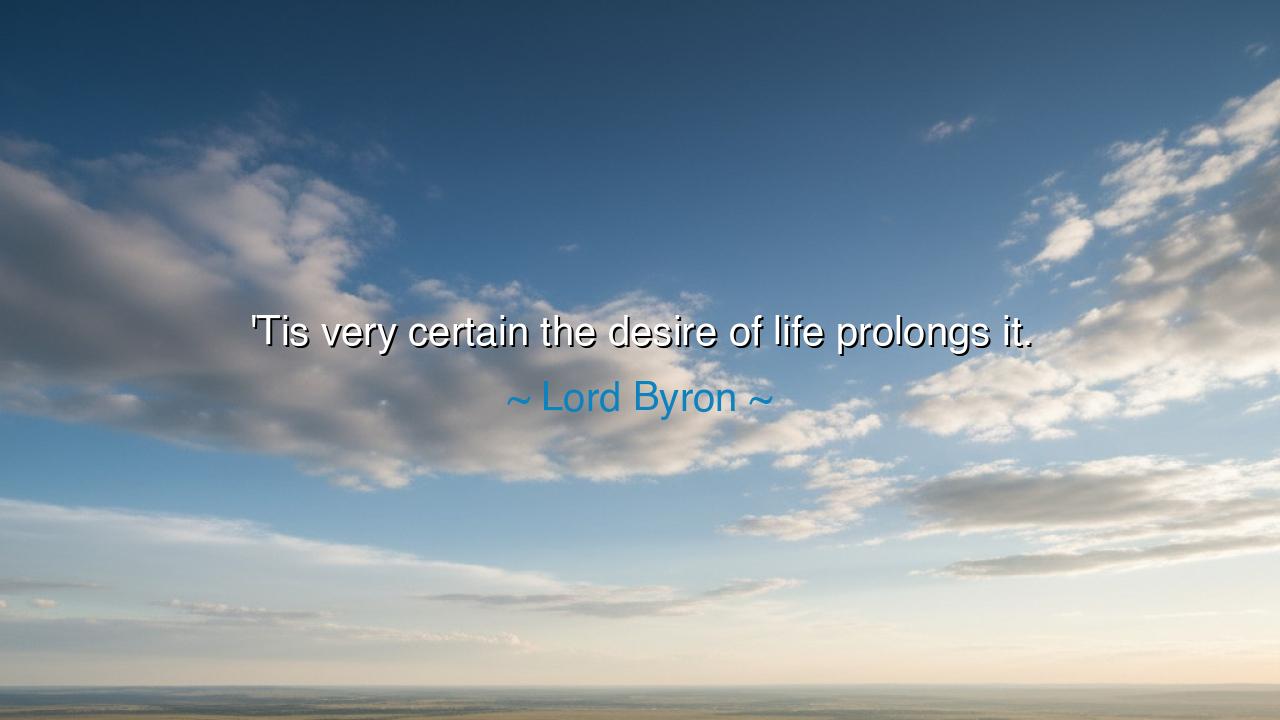
'Tis very certain the desire of life prolongs it.






The words of Lord Byron, “’Tis very certain the desire of life prolongs it,” carry the quiet power of one who had walked the edge between passion and despair, and yet discerned a great secret of the human heart. In this brief sentence, Byron unveils a truth both physical and spiritual — that the will to live is itself a sustaining force, stronger than medicine, deeper than reason. The human spirit, when anchored to purpose and aflame with desire, can endure the weight of suffering, outlast the decay of the body, and even summon strength from the brink of ruin. The desire for life, he declares, does not merely decorate existence; it sustains it.
Byron lived as a man of intensity — a poet, a wanderer, a rebel against the dull conventions of his age. He was haunted by mortality and yet obsessed with vitality. He saw in the “desire of life” a fire that could resist death itself. This was not mere romantic sentiment, but an observation drawn from experience. Those who live passionately — who find joy in art, love, or freedom — seem to defy the slow erosion of time. For them, life expands; it burns brighter, as if the soul’s yearning breathes new air into the fading lungs. To live is not simply to exist; it is to desire fiercely, to cling to meaning even in despair.
To the ancients, this truth would have been familiar. Aristotle taught that all things strive toward life — the seed toward the sun, the beast toward survival, and the human soul toward flourishing. The Stoics, too, saw in the will to endure a reflection of divine order, the spark of reason and spirit that refuses annihilation. Byron, inheritor of this lineage, expressed it through the language of poetry: life persists not through strength alone, but through the refusal to yield. Where the body falters, the mind — if filled with longing — commands it to stand once more.
Consider the story of Ernest Shackleton, the Antarctic explorer. When his ship, Endurance, was crushed by ice, he and his men were stranded in a frozen wilderness. Food was scarce, cold unrelenting, death imminent. Yet Shackleton refused despair. His unshakable desire to see his men live sustained them through impossible odds. Against nature’s cruelty, their will proved stronger than frost and hunger. Every step they took was powered not by strength of limb, but by the desire of life — the same force Byron spoke of, the immortal ember within mortality.
This truth is not confined to explorers and heroes. It burns quietly in the hearts of all who endure illness, grief, or loss. There are those who, through suffering, rediscover a reason to live — a child’s smile, a dream unfulfilled, a promise to keep. Science itself has found that those who hope, who desire to live, heal more swiftly and endure more bravely. Byron, though a poet, understood this before the physicians: the soul’s will can call the body back from the edge.
And yet, his words carry a second meaning — for desire is not only the preserver of life, but also its measure. To live without desire is to begin to die, though the heart may still beat. Those who lose all longing — for love, for beauty, for growth — become hollow, their days drained of color. Thus, Byron’s wisdom is not merely about survival, but about vitality. The desire of life is the desire to feel, to strive, to create. It is the divine spark that keeps man from sinking into numbness, even in the face of mortality.
So, my listener, take this lesson as both warning and blessing: guard your desire for life. Feed it with purpose, with curiosity, with love. Do not let the world’s weariness steal from you the hunger to live fully. When you fall, let your longing for life — for beauty, truth, or connection — lift you again. For as Byron teaches, death begins not when the body fails, but when the heart ceases to desire. Keep your flame alive, and life will meet you halfway, prolonging its gift with every beat of your unwavering will.
For indeed, ’tis very certain — the desire of life prolongs it — and those who live with fire in their souls never truly die.






AAdministratorAdministrator
Welcome, honored guests. Please leave a comment, we will respond soon